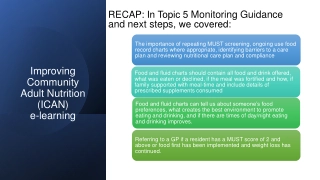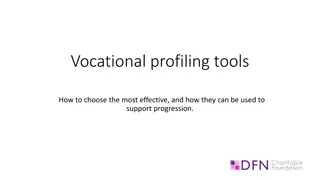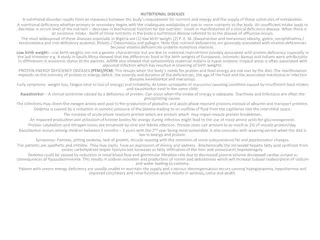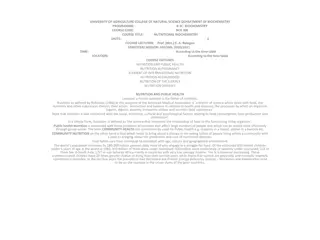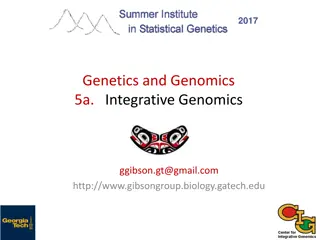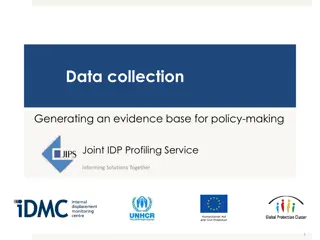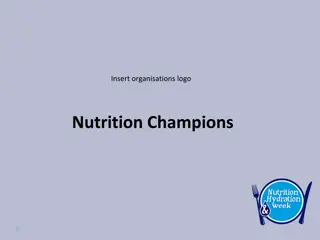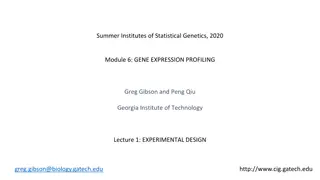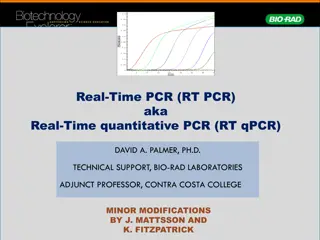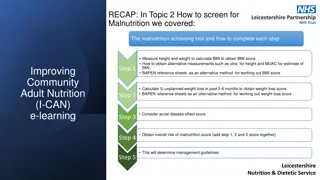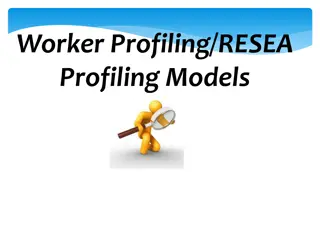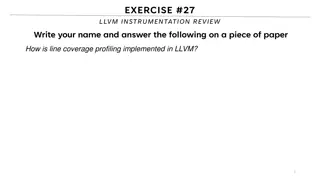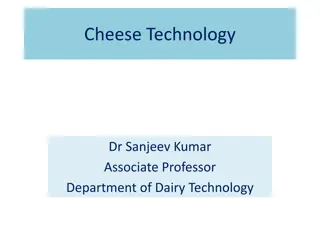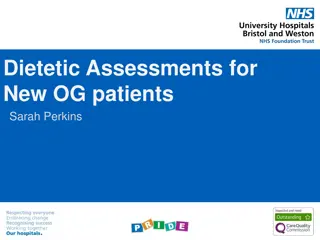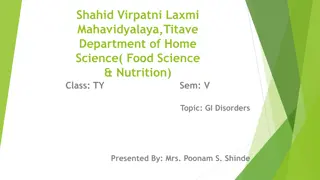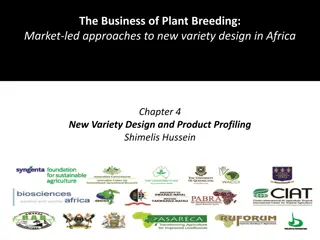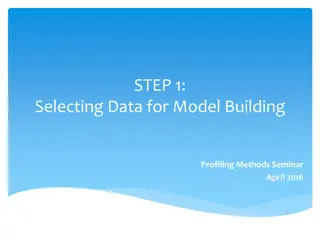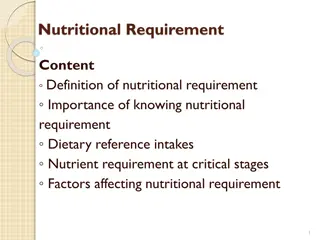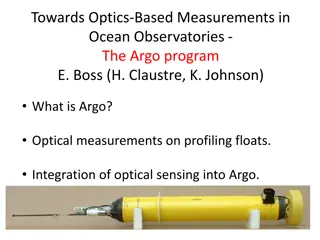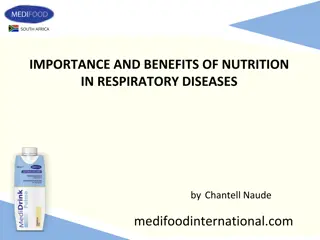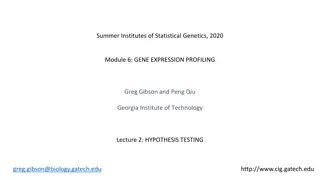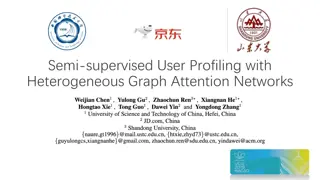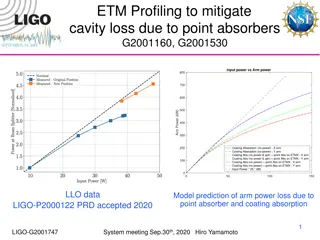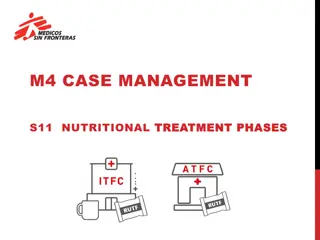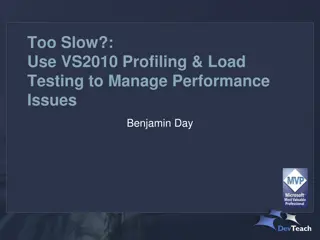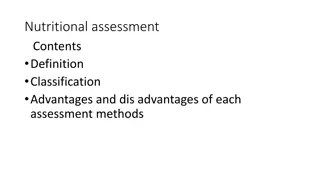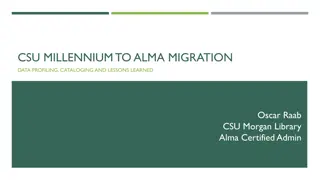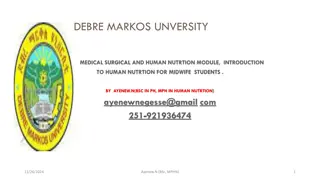Importance of Monitoring Guidance in Nutritional Care
This recap covers the significance of regular screening, using food record charts, identifying barriers to care plans, and reviewing nutritional compliance. It emphasizes the ICAN e-learning module and the key factors influencing nutritional care. The content highlights the importance of adequate fl
0 views • 16 slides
Vocational Profiling Tools for Career Progression
Vocational profiling tools help assess individual skills, interests, and needs to support career decisions. Components include dreams, skills, learning styles, and support systems. Effective profiles focus on aspirations, talents, challenges, and solutions, guiding individuals towards suitable emplo
4 views • 9 slides
Overview of Nutritional Diseases and Disorders
Nutritional diseases arise from imbalances between the body's nutrient and energy requirements and their supply. Nutritional deficiencies can lead to clinical diseases, while excessive intake can result in diseases of affluence. Common nutritional disorders include low birth weight, PEM, obesity, go
4 views • 6 slides
Nutritional Biochemistry: A Comprehensive Overview of Nutrition and Public Health
Nutrition, as defined by Robinson, explores the relationship between food and the human body's functioning. This course delves into key topics such as nutrition in pregnancy, childhood, and the elderly, as well as nutrition-related diseases. It emphasizes the importance of public health nutrition in
4 views • 7 slides
Genetics and Genomics in Integrative Biology
Delve into the world of genetics and genomics through the lens of integrative biology, investigating the differences between cell types, the rationale for gene expression profiling, and the analysis of differential gene expression in various diseases. Uncover the significance of gene ontology, co-ex
0 views • 22 slides
Importance of Data Collection in Policy-Making for IDP Profiling
Understanding the significance of collecting data for policy-making is crucial, especially in the context of Joint IDP Profiling services. Profiling IDPs through collaborative data collection helps identify displaced individuals or groups, leading to targeted advocacy, protection, assistance, and ev
0 views • 15 slides
Nutrition Champions: Improving Nutritional Care in Health and Social Settings
Nutrition Champions play a vital role in promoting food and drink as essential components of care packages in various settings. Their goal is to enhance nutritional and hydration care, share best practices, facilitate behavior change, and improve access to healthy food and fluids. The content discus
1 views • 21 slides
Gene Expression Profiling in Statistical Genetics Summer Institute 2020
This content provides information on the Summer Institutes of Statistical Genetics module, focusing on gene expression profiling. It includes details on the schedule, experimental design, RNA sequencing workflow, modes of bulk RNA sequencing, and RNASeq software. The content discusses crucial steps
0 views • 11 slides
Real-Time PCR and its Applications
Real-Time PCR, also known as quantitative PCR, is a specialized technique used in molecular biology for gene expression analysis, medical research, disease diagnosis, viral quantification, and more. It enables the real-time visualization and measurement of DNA sequences in a sample, playing a crucia
4 views • 8 slides
Malnutrition Screening and Nutritional Care Planning
In this overview, discover the process of screening for malnutrition, including calculating BMI, assessing weight loss, and determining overall malnutrition risk. Explore how to create a nutritional care plan based on the MUST score and set appropriate nutritional aims for patients.
1 views • 12 slides
Efficient Identification of Memory Chip Errors with On-Die ECC
State-of-the-art memory error mitigations face challenges when dealing with on-die Error-Correcting Codes (ECC). "HARP" introduces a Hybrid Active-Reactive Profiling method to address these challenges by analytically studying the effects of on-die ECC and identifying key issues. Through hybrid profi
1 views • 4 slides
RESEA Program in Worker Profiling and Reemployment Services
The RESEA program aids in assessing unemployment insurance eligibility and providing reemployment services to claimants. Profiling helps target those at risk of long-term unemployment. Coordination between UI and employment service providers is essential for effective state operations. New initial c
0 views • 24 slides
Enhancing Nutritional Security in SADC Communities through Sugar Fortification
Nutritional security is crucial for overall well-being, and this presentation explores the significant role of sugar fortification in improving micronutrient intake and combating malnutrition in SADC regions. Insights into the current status quo, strategies for enhancing micronutrient intake, and th
0 views • 15 slides
LLVM Line Coverage Profiling Implementation Overview
Line coverage profiling in LLVM is implemented using built-in instrumentation facilities. This approach involves inserting PGO probes, interpreting them as coverage measurements, and generating coverage reports to assess the coverage of a test suite. The process allows for generating profile informa
2 views • 19 slides
Racial and Identity Profiling Act (RIPA) in California
The Racial and Identity Profiling Act (RIPA) in California requires law enforcement agencies to collect demographic data and other identifying characteristics based on officers' perceptions during pedestrian and traffic stops. The purpose of RIPA is to eliminate racial and identity profiling, improv
3 views • 18 slides
Profiling in Forensic Psychology
Explore the concept of profiling in forensic psychology, including its techniques, history, and applications in criminal investigations. Learn about the various categories of profiling and the role psychologists play in identifying unknown individuals based on behavioral patterns and characteristics
3 views • 69 slides
DNA Profiling: Techniques and Applications
DNA profiling, invented by Alec Jeffreys in 1985, is a technique used to distinguish between individuals of the same species based on their DNA. The process involves breaking down cells to release DNA, cutting the DNA into fragments using restriction enzymes, separating and analyzing fragments based
12 views • 23 slides
Nutritional Recommendations for Type 2 Diabetes Management
Regularity and consistency in diet are crucial for individuals with type 2 diabetes to maintain stable blood sugar levels. The new nutritional pyramid recommended by the Ministry of Health of the Republic of Lithuania emphasizes the importance of balanced nutritional choices for managing diabetes. N
0 views • 15 slides
Cheese: Technology, Classification, Legal Standards, and Nutritional Value
Dive into the world of cheese with insights on its technology, definitions, classification, legal standards, and nutritional composition. Discover how cheese is made, categorized, regulated, and its key nutritional components.
0 views • 16 slides
The Future of Consumer Profiling and Commercial Communications: Insights from an International Conference
Explore the impact of platform economies, neuromarketing, and AI on commercial communications in the digital age. Learn how VLOPs use data to create user profiles and drive targeted advertising. Delve into the challenges of regulating VLOPs in the evolving landscape of consumer profiling.
0 views • 6 slides
Optimizing Nutritional Support for Upper GI Cancer Patients: Insights and Strategies
High prevalence of malnutrition in upper GI cancer patients highlights the importance of early nutritional screening and intervention. The role of prehab clinics in enhancing outcomes is gaining momentum. Insights from previous experience in nutritional screening reveal both advantages and challenge
2 views • 15 slides
Peptic Ulcers: Causes, Symptoms, and Nutritional Management
Shahid Virpatni Laxmi Mahavidyalaya conducted a presentation on gastrointestinal (GI) disorders, focusing on peptic ulcers. The content covers the etiology, symptoms, and nutritional management of peptic ulcers, emphasizing the importance of proper diet in managing this condition. Peptic ulcers, cha
0 views • 8 slides
Market-Led Approaches to New Variety Design in Africa
Explore Chapter 4 of "The Business of Plant Breeding" focusing on new variety design and product profiling in Africa. Understand core methods of product profiling, trait prioritization, and setting breeding objectives to meet client needs. Learn how to create new designs, set benchmarks, and make tr
0 views • 45 slides
Effective Data Selection Strategies for Model Building in Profiling Methods Seminar
Learn about the essential steps involved in selecting the right data for building effective models in the field of profiling methods. Understand the key considerations for data collection, formats, sample set determination, and targeting the right population to derive meaningful insights and outcome
0 views • 40 slides
Nutritional Requirements and Their Impact
Exploring the definition and importance of nutritional requirements, as well as the Dietary Reference Intakes, critical stages for nutrient needs, and factors influencing nutritional requirements.
0 views • 174 slides
Advancements in Optical Measurements for Ocean Observatories: The Argo Program
The Argo program integrates optical sensing into ocean observatories using profiling floats to gather data from the deep sea. With nearly 1,000,000 profiles to date, the Argo Observing System offers a global, real-time monitoring solution. Utilizing optics on profiling floats has enabled observation
0 views • 12 slides
Profiling, Travel Bans, and Legal Rights Overview
Profiling individuals based on their characteristics for making decisions raises legal and ethical concerns, particularly when involving race, ethnicity, or religion. This excerpt highlights a case involving profiling during air travel, leading to wrongful detainment and questioning of individuals w
0 views • 49 slides
Continuous Asphalt Mixture Compaction Assessment Using Density Profiling System
Development of a comprehensive work plan for the assessment of asphalt mixture compaction using the Density Profiling System (DPS). The project aims to create a master database of field and lab measurements, refine protocols for dielectric value-density relationships, propose changes for sensor bias
0 views • 11 slides
Importance and Benefits of Nutrition in Respiratory Diseases
Nutrition plays a crucial role in respiratory diseases such as COPD and CF, with malnutrition affecting a significant percentage of patients. Poor nutritional status is linked to increased morbidity and mortality in these patients, impacting pulmonary health and muscle function. MediDrink Pulmo offe
0 views • 7 slides
Basics of Hypothesis Testing in Gene Expression Profiling
The lecture covers the essential aspects of hypothesis testing in gene expression profiling, emphasizing experimental design, confounding factors, normalization of samples, linear modeling, gene-level contrasts, t-tests, ANOVA, and significance assessment techniques. Practical insights are shared on
0 views • 9 slides
Semi-Supervised User Profiling with Heterogeneous Graph Attention Networks
Utilizing heterogeneous graph attention networks, this study addresses the limitations of existing user profiling methods by integrating multiple data types and capturing rich interactions in user data. The approach tackles critical problems in representation learning, information propagation, and m
0 views • 15 slides
Improving Patient Outcomes through Frailty Support Project
This project, funded by the Carmarthenshire Intermediate Care Fund, aimed to provide flexible, person-centered care to support patient mobility and nutritional needs. Frailty workers implemented various strategies such as frailty snack boxes, daily frailty logs, grip strength assessments, and nutrit
0 views • 8 slides
ETM Profiling for Cavity Loss Mitigation Due to Absorbers
The ETM profiling aims to mitigate cavity loss caused by point absorbers through input power analysis versus arm power. The study includes data on coating absorption, arm power loss predictions, and optimization strategies such as polishing and mirror surface design. The effect of new coatings is co
0 views • 48 slides
Nutritional Treatment Phases in Pediatric Malnutrition
This session covers the different phases of nutritional treatment in pediatric malnutrition programs, focusing on objectives, specifics, and criteria for transitioning between phases. An illustrative case of Annika, a 3-year-old in the Transition Phase, is provided for practical application and unde
1 views • 5 slides
Managing Performance Issues with VS2010 Profiling & Load Testing
Explore the basics of web performance tests and load tests using Visual Studio 2010 Profiling and Load Testing. Learn how to identify and address performance issues, establish performance baselines, and catch problems early in the development cycle. Discover best practices for enhancing application
0 views • 60 slides
Neonatal Nutrition: Growth, Nutritional Support, and Management Phases
Neonatal nutrition, specifically focusing on growth faltering and early nutritional support, is crucial for the well-being of premature infants. Understanding growth rates and providing appropriate nutrients are key goals. Target growth rates and reference growth curves are important considerations.
1 views • 28 slides
Nutritional Assessment Methods
Nutritional assessment involves evaluating the nutritional status of individuals through various methods such as anthropometry, biophysical assessments, clinical evaluations, and dietary analysis. Anthropometric measurements, such as weight and recumbent length, play a crucial role in assessing grow
0 views • 48 slides
Food and Nutritional Toxicology
Food and nutritional toxicology delve into the science of poisons, toxins, and toxicants found in food. It covers substances harmful to consumers, including natural toxicants, contaminants, and additives. Nutritional toxicology focuses on the overlap between nutrition and toxicology, exploring the i
0 views • 17 slides
Challenges and Lessons Learned in CSU Millennium to Alma Migration
The migration from CSU Millennium to Alma presented various data profiling challenges and migration points, such as data cleanup recommendations, handling of electronic resources, post-migration cataloging issues, and unique complications in managing Alma instances across campuses. Lessons include t
0 views • 8 slides
Introduction to Human Nutrition for Midwife Students at Debre Markos University
This course on Human Nutrition addresses the importance of maintaining health and preventing diseases through proper nutrition. It covers topics such as nutrient impact on health, nutritional problems, assessment methods, intervention approaches, and surveillance. Upon completion, students will be e
0 views • 100 slides
